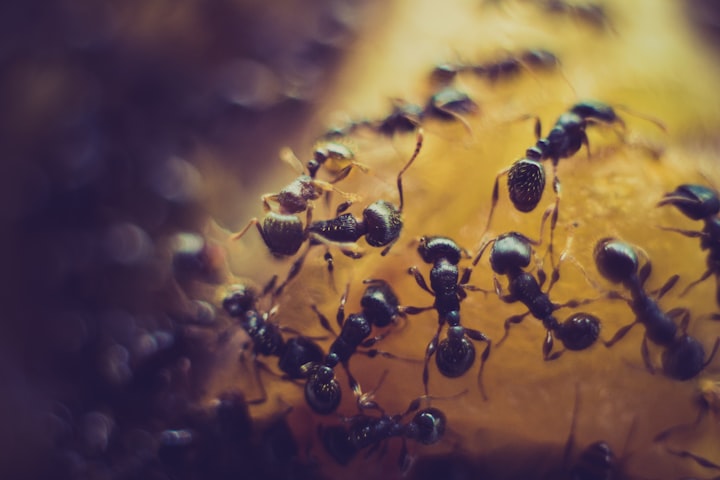The Ants' Reign of Terror
A Tale of Coexistence and Victory

There there was a small settlement on the boundaries of a large forest. The peasants led a tranquil existence, going about their daily tasks with happiness and contentment. Their joy was fleeting, though, as it is with all wonderful things.
The hamlet awoke one day to discover that their fields, which had once been abundant with crops, were now lifeless and barren. The people were perplexed by this abrupt change in the course of events and had no idea what had gone wrong.
They quickly learned from their inspection of the fields that a swarm of ants had attacked their crops and was gorging on everything in sight. The villagers weren't really concerned at first. As ants were such small creatures, people believed that they could easily deal with them.
Yet as time went on, the ants multiplied even more, and their hatred knew no bounds. Nothing seemed to work despite the villagers' best efforts, which included burning the fields and employing insecticides to get rid of them.
The peasants were at the ants' mercy since they had grown into a formidable army. They had no choice but to leave their houses and run for their lives.
The townspeople were not blind to the situation's irony. They had fallen because of the creatures they had rejected as unimportant. They had discovered that they couldn't stand up to the ants' vengeance.
The villagers ran away from their homes and sought safety in the nearby towns and cities. They talked about their situation with anyone who would listen in an effort to find a solution.
They were shocked to learn that their tale had gained widespread attention. People were awestruck by the idea that such little creatures could wreak such havoc, and the tale had gained popularity as a source of fun and laughing.
The villagers soon realized, though, that their tale had developed a life of its own, as time went on. They were no longer concerned about their situation; instead, they were amusing themselves with it. The peasants were now the target of jokes and parodies, and their sorrow had become a farce.
They were not blind to the irony of it all. They had changed from being the town's laughingstock to being the victims of a natural disaster. Their pride and self-respect had also been crushed by the ants' wrath, which had also devastated their homes and crops.
The only option left for the villagers was to accept the truth of their predicament. They understood that they needed to devise a strategy to eradicate the ants once and for all, but they also understood that they could no longer rely on outside assistance. They had to act independently and defend themselves from the ants' vengeance.
With plans to rid their field of the ants, the locals went back to their houses. They were aware that it would not be an easy assignment, but they were prepared to go to any lengths to vanquish their small adversaries.
They were shocked to discover that the ants had invaded not only their dwellings but also their farms. The ants in the peasants' fields and homes forced them to engage in a two-front war.
The people, though, did not give up easy. They understood they needed to handle the issue differently since they had learned from their past missteps. They chose to cooperate with the ants rather than try to exterminate them.
They discovered that the ants were not only destroying their crops but also enhancing the productivity of the soil. They managed to live in harmony with the ants and even took advantage of them.
They discovered ways to secure their crops while letting the ants continue to work in the soil and built barriers to keep the ants out of their homes. The peasants started slowly but surely reclaiming their land from the ants' vengeance.
Finally, the villagers were successful. In addition to defeating the ants, they had also gained important insight into collaboration and coexistence. They were not blind to the irony of it all. In their fight for existence, they had turned to the very monsters that had once been responsible for their demise.
The peasants went on to lead wealthy lives, and the account of the ants' fury served as a warning to succeeding generations. The ants, previously viewed as a nuisance, have evolved into a representation of fortitude and the strength of teamwork.
About the Creator
Rey Visionary
A passionate writer. I write books, stories, movie reviews, food reviews, etc. I also write contents as per the customer's demand.
Check my links:
Reader insights
Outstanding
Excellent work. Looking forward to reading more!
Top insights
Excellent storytelling
Original narrative & well developed characters
Heartfelt and relatable
The story invoked strong personal emotions






Comments (1)
This was such a great story that serves as a reminder that even the smallest things can have the biggest impact and that all life serves a purpose so we should always treat each other with respect! Beautiful!